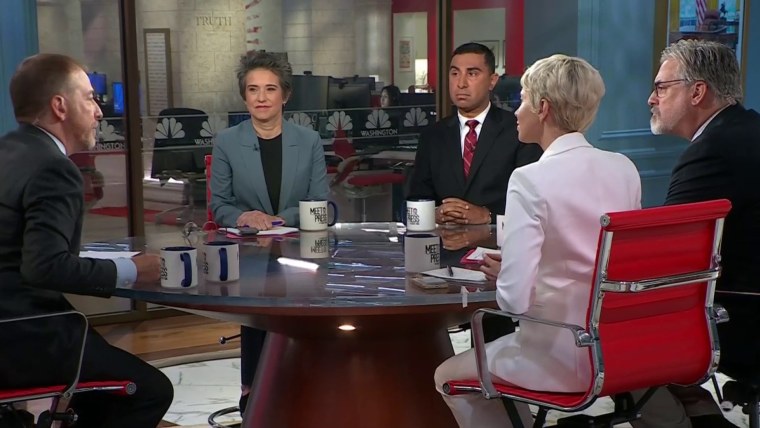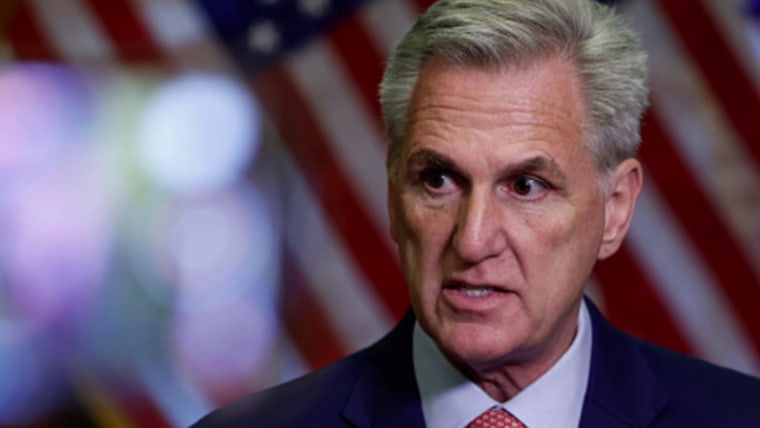August is a month when things usually get a little, well, weird in the realm of national politics. What would normally be nonstories can suddenly blow up in the vacuum of the congressional recess and general lack of political news. But the opposite seems to be happening for House Republicans, who have spent their brief time in power desperately trying to stretch the most minor issues into full-blown scandals. It seems oddly fitting that when it comes to impeaching President Joe Biden or members of his Cabinet, cooler GOP heads are prevailing this August — at least for now.
MAGA Republicans have been trying to avenge former President Donald Trump’s impeachments for years now. For a while, it seemed like the metaphorical bloodlust could be satiated by targeting Homeland Security Secretary Alejandro Mayorkas. But Speaker Kevin McCarthy, R-Calif., has fanned the flames in recent weeks, raising the prospect of opening an impeachment inquiry into Attorney General Merrick Garland. And while the House leadership team managed to punt on a resolution impeaching Biden earlier this summer, House Oversight Committee Chair James Comer, R-Ky., and other top Republicans have teased the prospect of an impeachment inquiry into the president’s alleged business dealings with his son Hunter.
MAGA Republicans have been trying to avenge former President Donald Trump’s impeachments for years now.
This feels like an important time to highlight the notable lack of evidence that anything the president or his team have done would clear the Constitution’s bar of “high crimes and misdemeanors” for impeachment. Republicans have put on months of hearings that have led nowhere and produced a string of supposed star witnesses whose testimony has fallen flat. In sum, Comer and company have yet to show any sort of wrongdoing on Biden’s part, let alone impeachable offenses. The same is true for Garland and Mayorkas.
So, while it’s correct to say that the use of impeachment as a rhetorical device has increased in recent years, a recent article from The New York Times is patently misleading. The article frames the two impeachments of Trump as a consequence of Republicans impeaching President Bill Clinton in 1998. Thus, the interest in impeachment from Republicans is presented as the natural response to Democrats impeaching Trump: “Tit for tat is the coin of the congressional realm.”
The truth is that Clinton’s impeachment and the political fallout it produced was, if anything, a hinderance to launching Trump’s first impeachment. Then-Speaker Nancy Pelosi, D-Calif., saw the backlash the Clinton impeachment produced as a warning, leaving her reluctant to start the process against Trump. The momentum only picked up once evidence of actual malfeasance was uncovered and, notably, it was a push from Democrats in vulnerable districts that gave Pelosi the political wiggle room to change course, allowing an impeachment push to move forward in September 2019. Trump’s second impeachment was preceded by an eye-popping spasm of violence broadcast around the world, and passed days after the Capitol was attacked by a pro-Trump mob.
The opposite is true in the case of McCarthy and the current GOP impeachment rhetoric. The party’s right-flank is still raring to go, but the loss of even a few Republican votes would cause the effort to collapse on the House floor. “The make-or-break votes will come from 18 politically vulnerable Republicans who represent districts Biden won in 2020 and other self-styled GOP pragmatists,” NBC News’ Sahil Kapur and Scott Wong reported on Wednesday. “And that may be difficult.”
Even the supposed low-hanging fruit of a Mayorkas impeachment may now be out of reach for Republicans.
Among the skeptics cited by NBC News is freshman Rep. Mike Lawler, R-N.Y., who told the reporters that impeachment “should not be political by any stretch.” While I disagree with him on that point — I’ve said repeatedly that impeachment is inherently a political, not legal, process — I agree with his assessment that the investigations the GOP has launched so far don’t have the goods. I also agree with the sentiments of Rep. Brian Fitzpatrick, R-Penn., who told NBC News that it feels like “we’re converting [impeachment] into essentially a vote of no confidence in the British Parliament. And I don’t want to see our country go down that path.”
Meanwhile, there’s been almost no talk of going after Garland since McCarthy first floated that idea. Even the supposed low-hanging fruit of a Mayorkas impeachment may now be out of reach for Republicans. Politico reported this week that chatter among the GOP caucus about charging the secretary has faded in recent months as hard-liners realized those votes just aren’t there, either. Even Rep. Ken Buck, R-Colo., who, as a member of the Freedom Caucus, is nobody’s idea of a moderate, dismissed the idea of impeachment as chasing a “new shiny object every week.” Buck is also a member of the Judiciary Committee, which has jurisdiction over drafting articles of impeachment.
All of this indicates that despite the August heat, the GOP’s impeachment fever seems close to breaking. But that doesn’t mean the issue will go away entirely. For now, as the House gears up to try to pass the spending bills needed to keep the federal government open, the GOP leadership can’t risk alienating the right flank by destroying their dreams entirely. And as long as McCarthy is held hostage, at least in part, by the Freedom Caucus, we can expect him to continue dangling the promise of an impeachment vote to try to stay on their good side.


